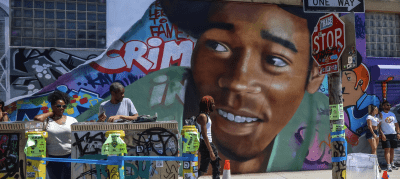Cut on the Bias: Talking to Performance Artist Chris Thorpe about his New Show, Confirmation

Chris Thorpe
photo by Arnim Friess
The performance artist Chris Thorpe has been causing a stir in his native England for several years now, particularly in the shows he has done with Hannah Jane Walker. His controversial solo show Confirmation, which examines the views of a white supremacist, recently premiered at the Edinburgh Fringe Festival, and now Thorpe is taking it on a tour that will include a slot at the Coil Festival at the Invisible Dog Art Center in Brooklyn from January 13-17. Confirmation is partly about the theory of confirmation bias, the tendency for people to search for information that confirms their own world-views. I asked Thorpe about this and also his own history in advance of his New York theater debut.
What first sparked your interest in solo performance?
I started doing solo stuff at Forest Fringe in their early days in Edinburgh about eight years ago. Originally it was a reaction against a lot of the Live Art stuff I was seeing, where the artist makes the work right in front of the audience. I love that world and being in it but I got irritated that in a lot of the performances language had become an afterthought. I felt like there was this detachment to it, this lack of craft—it was being stomped on by irony. So I started doing stuff that was all about language and following thoughts and it was really dense… and I didn’t have time to learn it and it all came out in one big block, rather than as a play. So I just sat there and read it at first. I collaborate with so many different people, so it felt good to have something that stood or fell on whether I could carry it in the moment.
Have you had training as an actor and worked in plays with other people, too? And does that interest you?
The only training I’ve had is years of making mistakes. I did study theater at university in Leeds but there was no performance training—just three spaces they threw you in and said, think about what this is, we’ll support you to fuck up for three years, and tell us what you’ve found out at the end. I guess I missed out on learning technique through that but picked up a load of performance skills that wouldn’t have been teachable. At least to someone like me. I mean, I didn’t really learn how to do accents for example—but I learned how to screw up in a useful way. I do plays sometimes and I love it but it’s not something I chase. Just if someone’s daft enough to ask me. I find it fascinating and I love the process when it happens.
Are there certain solo performances that you’ve seen that really inspired you?Melanie Wilson in Iris Brunette. She’s a sound artist I know who writes and performs among her soundscapes and I was blown away by the world she created. I guess I should say Eric Bogosian and Spalding Gray since I’m coming to Brooklyn but that feels like pandering—and cheating because I do love them so much, but I’ve only ever read them or seen them on video. Tim Crouch doing My Arm. Rachel Mars and Jamie Woods, who are two UK solo artists who make me jealous and helpless with laughter. Chris Goode doing Infinite Lives. Anyone who means it and pushes it. I saw Richard Dawson this year. He’s a storyteller and solo singer from Newcastle in England—he jumped off the stage and threw down the mic and redefined for me what it means to actually be in the room with the audience.
Tell me about the genesis of your new show Confirmation.
I wanted to examine my worldview—initially through the lens of unconscious confirmation bias. I wanted to try and have a reasonable conversation with someone whose views I might find deeply problematic and vice versa. I wanted to try and get a handle on what it was we both saw so differently in the same world. And I wanted that person, on paper, to be as much like me as possible— look like me in the mind of the audience. Same kind of background, national and economic, same ethnicity, because then it makes the differences in our worldviews less easily attributable to culture or experience. And a white guy from my background who is the ‘opposite’ of me is probably going to have some unpalatable views about race and history, for example. And I wanted to understand his worldview and cognition to explain my own. And of course it quickly became more complicated than that, because we crossed over in ways I never expected we would, and it became challenging to who I thought I was as much as an attempt to understand him. I kind of de-stabilized myself. And that’s what I try to bring into the room during the show.
To flip things around: do you think it’s possible to be too open-minded?
Yeah. Absolutely. I think there’s a difference between listening, thinking, responding, engaging on one hand and simply letting anything go on the other. That’s a constructed set of oppositions of course. But I think it’s true. You can, particularly as a ‘liberal’ like me, paralyze yourself through being afraid to challenge, in the same way the ‘conservative’ mindset is seen as afraid of being challenged. And of course the boring truth is you have to have flexibility and sometimes take a stand and at other times be willing to change. And part of that is using open-mindedness, and not hiding behind it as a flimsy excuse for a lack of rigorous thinking (which I guess is what being ‘too open-minded’ means to me).
Are you looking forward to performing in Brooklyn? Have you visited the US before?
I really, really am! I’ve visited the US quite a few times and performed here—but never in New York City and never in Brooklyn. And never a show like this one that’s so up close. I’ve visited Brooklyn before and always loved it. Feels amazing to be allowed to do something here.
For more information about Confirmation visit here.
You might also like 




















